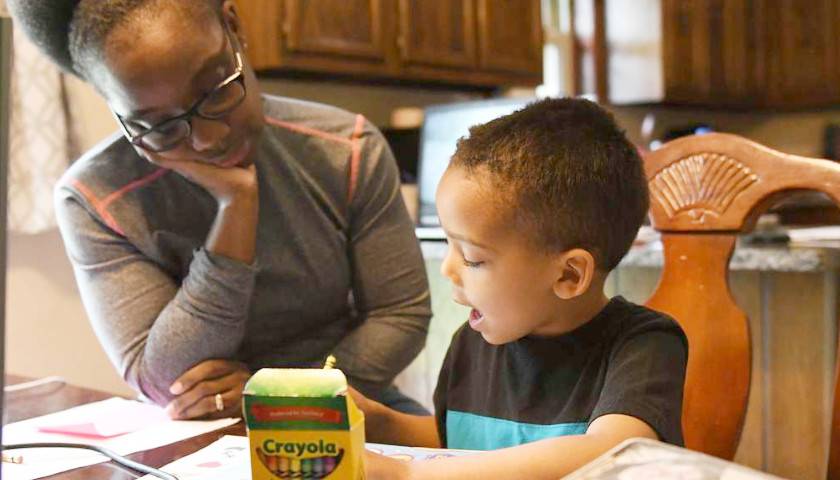by Heather Carson
If you’re feeling unqualified to homeschool, you’re not alone. The question of what and how to teach stressed me out early on in my homeschooling journey.
I found that having a good curriculum did a great deal to reduce my fears of not being qualified to teach. I wanted to strike a balance between bookwork, memorization, and fun interactive activities. I wanted to make sure to impart to my kids the basic body of knowledge necessary for a good education, yet I didn’t want to burn them out with endless worksheets.
Still, the world of homeschooling curriculum can be overwhelming, and the choices for teaching material are endless. Which ones are simply trends or fads to be avoided? Which ones best fit specific family and children’s learning styles?
If you’re struggling with the “what” and “how” of teaching at home, I’d love to share a short list of curricula that ended up being my absolute favorites for elementary education—all of which took the stress out of teaching.
Spell to Write and Read
About 10 years ago, a friend suggested Spell to Write and Read as her go-to spelling curriculum. We bought it, began to use it, and have never changed. Spell to Write and Read spans elementary through high school, covering phonics, reading, writing (including cursive), and grammar.
At first, Spell to Write might seem overwhelming to teach. It is very thorough. It deals with all spelling rules in the English language and gives step-by-step instruction for how to take your child from phonics to a detailed understanding of all spelling rules.
Spell to Write is designed to be used with the accompanying WISE Guide for Spelling, which includes each spelling list given, along with “Enrichment” lessons that cover grammar, word etymology, and more. Once I got the hang of teaching this curriculum, I never looked back. I love that it teaches skills such as alphabetizing, synonyms and antonyms, and Greek and Latin roots. This has been a one-and-done curriculum for us.
Apologia Science Curricula
Apologia is a company that produces faith-based curricula. We have used this resource for the sciences, and to date, we’ve studied zoology, earth sciences, chemistry, physics, and human anatomy.
Each subject comes with a teacher’s book and an accompanying student journal. Beyond this, each lesson is very clear and easy to teach, with the journals containing engaging activities that often overlap with other subjects. There is copy work, vocabulary, and even building projects and experiments that get you outside and away from the desk.
I often use Apologia as an opportunity to schedule field trips that relate to our topic, which is enriching for my kids and me.
Story of the World
We started using Story of the World when our oldest kids were in elementary school. In four volumes, it covers earliest recorded history all the way into the 21st century. There are accompanying workbooks as well as printable coloring sheets for younger children. I usually read a chapter over breakfast, and if the subject is of particular interest, I will look up a video online as a supplement.
Alongside this, I check out books from the library to pair with our reading for the week. We have included complementary trips to history and art museums, too. What I like most about this curriculum is that it really does make history like reading a story. It’s engaging and fun, and I like that I am learning right along with my kids.
Math-U-See
Probably the subject I felt most intimidated by was math. It was not my best subject in school, and I didn’t want to hold my kids back. What I have liked about Math-U-See is that is comes with videos for each lesson and many practice pages to help master the concepts being taught.
In particular, I like how this curriculum caters to the younger grades: It comes with math manipulatives, in the form of blocks, to help visualize the math concepts being taught. The curriculum gives younger children a good foundation and preparation for upper-level math.
First Language Lessons
For grammar, my primary go-to has been the First Language Lessons series. These books use classical techniques such as poetry memorization and narration to develop your child’s language abilities. It’s inexpensive and only requires lined paper for your child to complete the lessons, although in the beginning many of the lessons are oral.
What I’ve liked about First Language Lessons is that each lesson is brief and only takes about 10 minutes. All parts of speech are covered, and as your child progresses, writing becomes more of a focus.
The downside is that the lessons tend to be repetitive; however, I just use the curriculum in the way that works best for us, skipping ahead when needed. Poetry memorization is a highlight of this curriculum: I love how my children have taken to this and seem to enjoy it.
Online Resources
I’m a firm believer in pen-to-paper learning. Even so, there are many online resources we have taken advantage of from time to time.
Starfall at starfall.com is a very fun introduction to phonics. There are games and songs to help reinforce the learning. There are printable and coloring sheets as well.
Khan Academy at khanacademy.org is truly amazing for math and science. If one of my kids is struggling with understanding a certain concept, we can simply look up a video and get a thorough explanation.
Education.com has a plethora of worksheets for those days when what’s needed most is reinforcement of a concept. It’s free to join, and with a click and a printer, you are ready to go.
There are so many online resources, but these are truly my favorites.
I hope this helps make choosing a curriculum a bit less overwhelming. And remember, if it’s not working for your child, then move on and find something that does!
Happy homeschooling!
– —
Heather Carson is a homeschooling mother of eight and lives on a hobby farm. She enjoys teaching her children, writing, gardening, and Saturday dates with her husband of 21 years.





